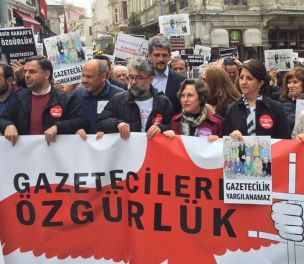Journalist Hakan Aygün was detained for mocking the President's coronavirus fundraising campaign. (Photo: AA)
Click to read the article in Turkish
Amnesty International has released a statement on the government's restrictions on freedom of speech during the Covid-19 pandemic.
"The authorities are making the situation worse by using the pandemic as an excuse to further stifle the right to freedom of expression," it said. "They are hounding social media users, journalists, doctors and others, and invoking legal provisions that criminalize dissent, in efforts to silence its critics."
With the detentions in the early days of the pandemic, the government gave a "very powerful message that it would not allow questioning and open discussion of its strategy, leading to fear and self-censorship," according to the statement.
Here are highlights from the statement:
Around 54 million people use social media in Turkey, nearly two-thirds of the population. The country ranks seventh on the list of active Twitter users (13.6 million people) and tops the list for legal requests by the state to remove content.
Under the guise of combating 'fake news', 'incitement' or 'spreading fear and panic', the Turkish authorities are using criminal law provisions to target people who are discussing the pandemic online.
"Provocative coronavirus posts"
Between March 11, when the first positive case of the infection was declared, and May 21, the Cyber Crimes Unit of the Interior Ministry alleged that 1,105 social media users had made propaganda for a terrorist organization, including by "sharing provocative coronavirus posts." Of these, 510 were reportedly detained for questioning.
*When lorry driver Malik Yılmaz shared a TikTok video on March 28 with his 30 followers, he didn't think his comments would go viral or that he would end up in police detention. In the video, he expressed his frustration with the "stay home" message:
"How would you suggest I do that? I am not retired or a civil servant, I am not rich. I am a worker, a lorry driver. If I don't work, I don't eat. I can't pay my bills. Not being able to pay the bills is worse than death... But this virus won't kill me, what will kill me is your system."
His alleged crime was 'inciting the public to break the law'. He was questioned three times, given a foreign travel ban and must now sign in at a police station weekly. As a result, he lost his job and fears he will be prosecuted under Article 217 of the penal code, punishable by up to two years' imprisonment.
Journalists and rights defenders were detained
*On March 18, Güngör Arslan heard that his colleague, İsmet Çiğit, an editor of Kocaeli Ses, a local newspaper in the western province of Kocaeli, had been arrested after an article on the newspaper's website reported two coronavirus deaths in a local hospital. Arslan rushed to the police station to explain that as the editor of the website, he was responsible. Ciğit was released, Arslan was detained instead.
After being questioned by the state prosecutor, he was also released. Speaking to Amnesty International a few weeks later, he said, "The state prosecutor said to me 'don't write these articles.' He literally said that to me... I have no idea whether this will turn into a prosecution, but it was certainly intimidating.
On March 30, the police questioned Diyarbakır-based journalist and human rights defender, Nurcan Baysal, about 10 of her social media posts, eight of which related to Covid-19, as well as two articles about the situation in Diyarbakır during the pandemic.
She had to give a second statement the next day regarding accusations that she had "incited the public to enmity and hatred," a crime under Article 216 of the Turkish Penal Code punishable by one to three years in prison.
In April, she was again summoned for questioning, this time over a 2016 tweet about Sur district. Since January 2018, Baysal has been detained three times and armed police have raided her house twice.
*Former Halk TV editor-in-chief Hakan Aygün was remanded in prison on April 4 after he implicitly criticized President Recep Tayyip Erdoğan (he did not name him) for sharing a bank account number for public donations to help deal with the pandemic. In four posts, Aygün compared IBAN (the International Bank Account Number shared by the President) with "iman" ("faith" in Turkish), suggesting that those who claim to have faith are actually all about money.
Aygün was charged with 'inciting the public to enmity and hatred' and 'insulting the religious beliefs of a section of society', both punishable by imprisonment. He was released on 6 May at the first hearing. His prosecution continues.
Targeting doctors
*The Turkish Medical Association (TTB) is accustomed to being in the authorities' line of fire.
Police have twice summoned psychiatrist Dr. Özgür Deniz Değer, TTB Chair in Van, eastern Turkey, since the pandemic began. On March 24, he was questioned about "threats to create fear and panic among the people", a crime under Article 213 punishable by two to four years in prison. This was related to an interview with the Mesopotamia News Agency in which he discussed the risks of Covid-19 spreading in prison and criticized the Health Ministry for not working with medical associations and not taking seriously the threat posed by the virus. http://bianet.org/english/law/225502-investigations-against-physicians-undermine-pandemic-response-in-turkey
Subsequently, the medical association's Twitter account raised concerns about the lack of personal protective equipment, highlighted the deaths of health workers, and shared a video about the situation in Urfa prisons. Dr. Osman Yüksekyayla, general secretary of the association, and Dr. Melik were detained and questioned on April 27 about dozens of these social media posts. They were released on bail, banned from foreign travel and required to sign in at a police station monthly. (AS/VK)




.jpg)

